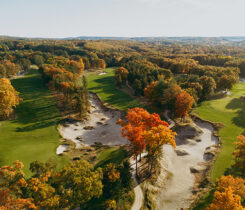From seed to green: The dedication of Tee-2-Green farmers in cultivating premium bentgrass
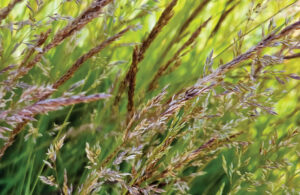
(Photo: Lewis Sharp)
“Average” — that is the prediction of Terry Plagmann, president of Tee-2-Green, for this year’s crop of bentgrass.
But there is nothing average about the work that goes into harvesting this seed, or the levels Tee-2-Green farmers go to in their efforts to ensure the seed is pure.
“This isn’t like farming wheat and you know exactly how much you got by the bushels or by the weight of the truck,” Plagmann says. “Bentgrass is a whole ’nother thing because it’s so small.”
Rodney Hightower is an Oregon farmer and a board member of Tee-2-Green. He farms eight different crops on 700 acres, including turf type perennial ryegrass, turf type tall fescue, sugar beets for seed, coriander (cilantro), brown teff and ivory teff. But he says that by far, creeping bentgrass is the most intense crop.
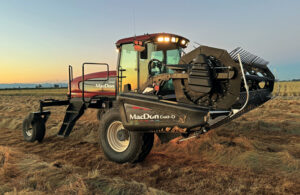
Modern farming equipment, like the bentgrass thrasher, has improved efficiency for bentgrass seed farmers. (Photo: Lewis Sharp)
“We have a couple crops that the details are important — when they need to be sprayed, they need to be sprayed. When they need to be irrigated, they need to be irrigated now,” he says. “But our bentgrass that we grow for Tee-2-Green is one of the most intense crops we grow. There are just a lot of little details you have to pay attention to to get a quality crop.”
Certified platinum
For example, creeping bentgrass requires irrigation. It needs to be fertilized. And the farmers pay close attention to potential pests, more so than in their other crops.
Bentgrass seed is harvested in mid-August — as Golfdom was going to press in mid-August last month, the Oregon farmers were at the same time wrapping up the harvest. Bentgrass pollinates later and is harvested later than most grasses. The harvest life of a field is six years before it is changed out for another crop.
Oregon State University (OSU) offers the Oregon Seed Certification Service (OSCS) through the Department of Crop and Soil Science. OSU has been certifying seed in Oregon since 1937, about 250,000 acres annually.
The OSCS certification is a big deal to Plagmann and his board of directors.
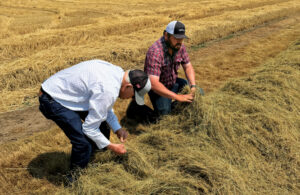
Terry Plagmann (left) and Garrett Hightower check out the bentgrass crop. (Photo: Lewis Sharp)
“Certification through Oregon State University is basically your guarantee, if you’re a buyer, that the seed is authentic and what’s in the bag is what the label says it is,” Plagmann says. “(OSU) comes out and inspects the field — the seedling — annually every year before the harvest. They give it a rating on what they see in the field. If it passes, then you get the Oregon blue tag.”
Tee-2-Green goes one step beyond that, Plagmann says.
“Our quality is zero crop, zero weeds,” he says. “You can get a certified blue tag with .04 crop and .03 weeds and still have a certified blue tag. But we do not accept any seed from our growers that has any other crop or any weed seed in it, period.”
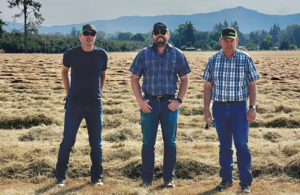
Brothers Austin and Garrett Hightower with their dad Rodney. (Photo: Lewis Sharp)
“Tee-2-Green prides itself on growing quality seeds — and we appreciate the people that make the decisions to purchase our seed and plant it on their courses,” Hightower adds. He says that when the seven farmers who comprise Tee-2-Green meet for their regular board of directors meetings, the group has a mutual respect for their fellow farmers.
“There’s not a lot of dissension, there’s not a lot of arguing,” Hightower says. “We all respect each other. I’m not saying that somebody doesn’t have a different opinion occasionally, but we all agree most of the time. Sometimes we have to make difficult decisions. If we have too much seed, you have to take a field of bentgrass out early, and that’s a hard decision. But we understand that we have to make a decision that’s best for the company.”
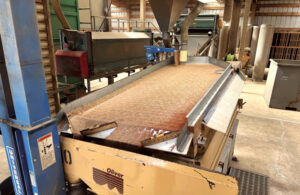
The process of seed cleaning. (Photo: Lewis Sharp)
A family affair
Hightower is a second generation farmer, and his sons, ages 36 and 31, farm alongside him. Growing bentgrass seed seems to be a multigenerational family affair for most of the farmer co-owners of Tee-2-Green, Plagmann says.
“My dad started (farming bentgrass seed) before I started high school … and I’m literally going to my 61st high school reunion this weekend,” Plagmann says. “These growers are second, third, some of them have teenage young people, sons or daughters working for them, driving combines. We’ve actually got fourth generations doing this.”
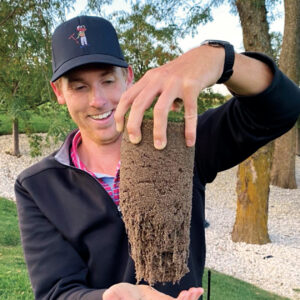
Austin Banzet shows off Pure Distinction roots on a plug from Wolf Creek Golf Links, Olathe, Kan. (Photo: Lewis Sharp)
It has gotten easier over those 60 years, Plagmann says. Modern farming machinery has taken giant leaps compared to the farm equipment he was using in the 1960s and 1970s.
Hightower says the best thing about having his job is the diversity it offers. Similar to a superintendent, he finds himself doing something different each day. Also similar to the work of a superintendent, he likes the satisfaction of growing a crop.
“You start preparing the ground and planting the seed, and you tend the crop and you get to see the fruits of your labors when the harvest comes around,” he says. “There’s some satisfaction in that.”
Though he doesn’t play golf himself — his summers are too busy farming, he says — Hightower is well aware of what the results of his bentgrass seed farming means to the golf world.
“There is some pride in growing Tee-2-Green and growing a product that you know is very high quality,” Hightower says. “There’s pride in knowing that the seed I grow ends up on some of the most prestigious and well-managed courses in the whole world. There really is a lot of pride in that. I think all of the growers in Tee-2-Green take pride in those same things.”
The legend of Lew
A self-proclaimed “Indiana hillbilly” is a friend to superintendents worldwide
Lewis “Lew” Sharp grew up in the game of golf. He started working in golf course maintenance at age 10, dragging hoses and string trimming. He was further pulled in that direction by his friendly neighbors — Pete and Alice Dye. Working with the Dyes, he amassed dozens of golf course builds and hundreds of renovations around the world.
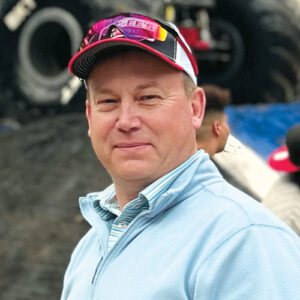
Lewis “Lew” Sharp
For the last 20 years, Sharp has traveled the world representing Tee-2-Green. It seems that he knows about everyone in the golf business, and with a sharp memory, he recalls every course he’s ever worked on.
“My main mission is to be answering agronomy questions, helping out superintendents when they’re in trouble,” Sharp says. “It could be anything from disease issues, fungicides, bunker sand, the latest equipment. I don’t care what they call me about, I will be there to back them up. Some days you’re the agronomist for Tee-2-Green and the next you’re a counselor during the high-stress times. To me this job is all about the relationships and turning those relationships into a long-term friendship.”
The hardest thing about Sharp’s job, he says, is staying well versed on the new fungicides, herbicides and insecticides. When he gets a call about what product to apply, he needs to know what is legal and safe to use in various locations, including in the U.S., Canada and Europe.
Every December, Sharp travels to Oregon to see the Tee-2-Green farmers in person for a holiday party. He’s made a tradition of treating everyone to a year-in-review show and dinner. The year in review includes testimonials from superintendents from around the globe and short movies where the growers can see how and where their bentgrass is being used.
“It’s always good to see the farmers,” Sharp says. “They’re all pretty much third generation (farmers). I get a lot of knowledge watching fathers, father-in-laws, sons, grandsons all working together. It makes me feel good to know we’re backed up by all these years of knowledge and experience.”
Rodney Hightower recently welcomed Sharp to his farm to see him and his sons at work. Hightower always looks forward to Sharp’s visit.
“I have never met anybody quite like Lew,” Hightower says. “I love that guy. He’s become a very good friend of mine. The experience and the knowledge he has is amazing.”
“Lew is one-of-a-kind,” says Tee- 2-Green president Terry Plagmann. “I travel with him two or three times a year. He walks into a place in California, and the superintendent says, ‘Hey, Lew, what do I do about this algae in my pond?’ And he doesn’t sell him anything, he just helps him out. Then he gets in the car and takes a call and I hear him say, ‘I got some spare time, I’ll come help you tomorrow.’ You just don’t find people like that very often.”
Not bad for a person who refers to himself as an “Indiana hillbilly.”
“I’m so proud to work with these farmers,” Sharp says. “We’re a co-op, I answer to a board of directors. I answer to farmers, and I’m so proud to have them as my bosses because I know that I have a quality product to deliver year after year.”









